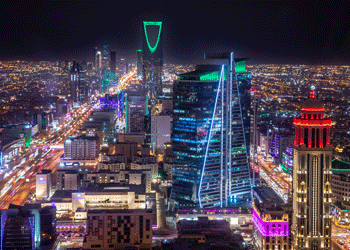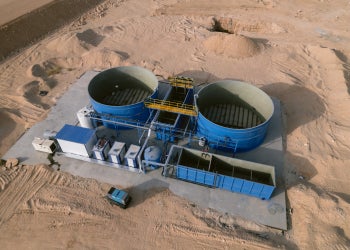UAE economy steers clear of global woes
24 April 2023
 Related reads on the UAE:
Related reads on the UAE:
> Two billion riders use Dubai Metro
> Surge in tourists boosts Dubai hospitality
> Abu Dhabi strengthens its position at home
> UAE calls for reform of international financial institutions
> UAE president appoints son as Abu Dhabi crown prince
> UAE and Israel sign customs cooperation deal
> UAE moves ahead with digital currency

The UAE economy is expected to maintain a course of robust economic growth in 2023, avoiding the effects of the creeping global economic slowdown.
The Washington-based IMF projects a growth rate of 3.5 per cent for the country in 2023 – a rate of expansion well clear of the 2.8 per cent global average amid what has become a worldwide slowdown. The forecast is also ahead of the projected 3.1 per cent growth rate for the Middle East and North Africa.
Though a step down from the 7.4 per cent growth in 2022, and a modest downgrade of 0.7 per cent from the projection in October of a growth rate of 4.2 per cent this year, the UAE’s economic activity remains firmly buoyant. Its growth is forecast to rise again to 3.9 per cent in 2024.
The minor slowdown in the UAE’s economic growth is primarily due to Opec+ cutting oil production quotas, which is reversing some of the past year’s increases in oil production across the region. However, despite the cuts and the weakening of oil prices, the UAE’s oil sector revenues are expected to remain healthy, maintaining a government budget surplus of approximately 3.7 per cent of GDP this year.
Inflationary pressures have also eased since the peak of last year. Disinflation is expected to continue in the coming months, reaching 2.1 per cent this year, down from 4.8 per cent in 2022.
In light of such considerations, the Central Bank of the UAE has also put out a more optimistic projection of a sustained GDP growth rate of 3.9 per cent in 2023.
More positive still is Issam Abu Suleiman, regional director for the GCC at the World Bank, who has forecast that the UAE economy will continue to grow by 4.1 per cent despite the challenging global economic conditions.
More limited projections also exist, including a report by the Institute of Chartered Accountants in England & Wales and Oxford Economics that estimates that the growth will slow to 3.2 per cent in 2023, as weaker oil growth weighs on the more buoyant 3.9 per cent growth in the non-oil sector.

Positive sentiment
For businesses on the ground, the projection of close to 4 per cent non-oil growth remains cause for optimism.
This has been reflected in the S&P UAE Purchasing Manager’s Index (PMI), which rose yet higher from 54.3 in February to 55.9 in March (with a value over 50 indicating growth).
S&P’s report noted a pick-up in new order growth to a five-month high, as well as a rise in capacity pressures that has seen the fastest increase in employment since July 2016. The construction sector was particularly active in hiring amid a slew of new project launches led by off-plan real estate schemes.
The UAE aims to double the size of its economy by 2031 as it continues to diversify away from oil and gas
The UAE’s rebounding real estate market is more generally a key driver of the country’s sustained non-oil growth. House prices are on the rise in Abu Dhabi and property sales in Dubai have hit decade highs in recent months.
Tourism is also recovering, with Dubai regaining its spot as one of the world’s busiest aviation hubs. International visitors are forecast to increase by 20 per cent in 2023.
Ipsos’ Primary Consumer Sentiment Index ranked the UAE second in the world in terms of consumer perceptions of the strength of the economy, with 63 per cent of respondents believing it to have a strong economy. Of those polled, 81 per cent also reported being comfortable with investing in the future and 86 per cent expecting the local economy to be stronger in the next six months.
Ratings agency Moody’s has also reaffirmed the UAE’s long-term local and foreign currency issuer ratings at Aa2 with a stable outlook, citing exceptionally low credit risk with its well-balanced budget targets and limited federal spending requirements.
The introduction of corporate income tax, effective 1 June 2023, will result in further government revenue growth starting from 2025.
Moody’s also pointed to the UAE’s ongoing economic diversification. The country’s progress to date in this area remains well ahead of its GCC peers in terms of the expansion of its non-hydrocarbons revenue, private sector development and overall international attractiveness to foreign businesses and talent.
Future outlook
Looking ahead, the UAE aims to double the size of its economy by 2031 as it continues to diversify away from oil and gas. To achieve this, it needs an average of 7 per cent GDP growth a year, which it hopes to achieve by forging trade agreements and investing in global growth sectors such as green hydrogen.
The UAE’s foreign trade rose by 17 per cent year-on-year to reach AED2.2tn ($599.1bn) in 2022. In the decades ahead, the country aims to attract AED550bn in foreign direct investment by 2031 and AED1tn by 2051.
Abdullah bin Touq al-Marri, the UAE’s minister of economy, has noted that the UAE’s active business environment, which is supported by both national and foreign private sectors and an attractive labour market for international talent, has contributed to the growth of the economy.
By 2030, the government aims to increase the number of small and medium-sized enterprises (SMEs) to 1 million and raise the contribution of SMEs to the country’s non-oil GDP to 63.5 per cent.
In January this year, Dubai also launched its D33 economic agenda, which aims to grow the emirate’s economy to AED32tn by 2033 through a combination of transformative projects and a doubling of foreign trade to AED25.6tn by expanding trade links with Africa, Latin America and Southeast Asia.
This month's special report on the UAE includes:
> GOVERNMENT: Abu Dhabi strengthens its position at home
> ECONOMY: UAE economy steers clear of global woes
> BANKING: UAE lenders chart a route to growth
> UPSTREAM: Strategic Adnoc projects register notable progress
> DOWNSTREAM: Gas takes centre stage in Adnoc downstream expansion
> POWER: UAE power sector shapes up ahead of Cop28
> WATER: UAE begins massive reverse osmosis buildup
> CONSTRUCTION: Dubai construction needs major project launches
Exclusive from Meed
-
 Solar deals signal Saudi Arabia’s energy ambitions
Solar deals signal Saudi Arabia’s energy ambitions13 February 2026
-
 Saudi Arabia appoints new investment minister
Saudi Arabia appoints new investment minister13 February 2026
-
 Indian firm wins major Oman substation contract
Indian firm wins major Oman substation contract12 February 2026
-
 Developers appoint contractor for $500m wastewater treatment project
Developers appoint contractor for $500m wastewater treatment project12 February 2026
-
 Dewa raises Empower stake in $1.41bn deal
Dewa raises Empower stake in $1.41bn deal12 February 2026
All of this is only 1% of what MEED.com has to offer
Subscribe now and unlock all the 153,671 articles on MEED.com
- All the latest news, data, and market intelligence across MENA at your fingerprints
- First-hand updates and inside information on projects, clients and competitors that matter to you
- 20 years' archive of information, data, and news for you to access at your convenience
- Strategize to succeed and minimise risks with timely analysis of current and future market trends

Related Articles
-
 Solar deals signal Saudi Arabia’s energy ambitions
Solar deals signal Saudi Arabia’s energy ambitions13 February 2026
 Commentary
Commentary
Mark Dowdall
Power & water editorSaudi Arabia’s recent agreement to build $2bn-worth of solar power plants in Turkiye is the latest sign that the kingdom’s energy influence is changing.
Historically, this was measured in oil barrels and export volumes. Increasingly, this is extending to capital, structuring expertise and the ability to deliver record-low tariffs in competitive markets.
Announcing the deal, Turkish Energy Minister Alparslan Bayraktar said tariffs for the plants would be the country’s lowest on record, with electricity purchased under 25-year power purchase agreements.
It followed another announcement, in January, that Acwa is investing $200m to build a large-scale solar photovoltaic (PV) plant in the Philippines.
Whether Saudi-backed companies ultimately retain long-term stakes or primarily develop and build the assets, their role at the front end is significant.
Sponsors that bring sovereign backing, clear procurement processes and access to low-cost financing can influence tariffs and contract terms from the outset.
There is also a geopolitical layer. Investing in Turkiye, or anywhere for that matter, strengthens political and economic ties at a time when regional alignments are shifting.
Energy infrastructure is also long-term by its nature. It connects ministries, regulators, lenders and operators in relationships that often extend well beyond a single transaction.
Saudi Arabia has spent the past few years refining its approach to pricing, structuring and financing large-scale renewables at home.
Exporting that expertise may not rival oil in scale or visibility, but it does signal that Saudi Arabia is becoming more than just an energy supplier.
Increasingly, it is becoming a participant in how other countries design and finance their energy transitions. That influence is still significant.
https://image.digitalinsightresearch.in/uploads/NewsArticle/15645903/main.jpg -
 Saudi Arabia appoints new investment minister
Saudi Arabia appoints new investment minister13 February 2026
Register for MEED’s 14-day trial access
King Salman Bin Abdulaziz Al-Saud has made a series of senior government changes, including Khalid Al-Falih leaving his role as investment minister to become minister of state and a member of the cabinet.
Al-Falih has been replaced by Fahad Al-Saif as investment minister. Al-Saif has been head of the Investment Strategy and Economic Insights Division at the Public Investment Fund (PIF) since 2024. That role involved formulating PIF’s long-term investment strategy. He has also served as head of the Global Capital Finance Division, a role he has held since joining PIF in 2021.
The change of investment minister comes at a time when securing investments has become a key priority for Saudi Arabia as it prepares to hand over more projects to the private sector for delivery.
King Salman also named Abdullah Al-Maghlouth as vice-minister of media and Abdulmohsen Al-Mazyad as vice-minister of tourism. Khalid Al-Yousef was named attorney general, and Sheikh Ali Al-Ahaideb will serve as president of the Board of Grievances.
Faihan Al-Sahli was selected as director general of the General Directorate of Investigation, while Abdulaziz Al-Arifi was chosen to lead the National Development Fund. Haytham Al-Ohali will head the Communications, Space and Technology Commission, and Fawaz Al-Sahli will chair the Transport General Authority.
https://image.digitalinsightresearch.in/uploads/NewsArticle/15645415/main.gif -
 Indian firm wins major Oman substation contract
Indian firm wins major Oman substation contract12 February 2026

India’s Larsen & Toubro has won a contract to build the Majan 400/220/132kV grid station in Oman.
Estimated to cost $100m, the project includes an associated 400kV line-in line-out underground cable from Sohar Free Zone to the Sohar Interconnector Station.
The contract was awarded by Oman Electricity Transmission Company (OETC), part of the government-owned Nama Group.
The grid station will comprise eight 400kV gas-insulated switchgear (GIS) bays, eight 220kV GIS bays and 10 132kV GIS bays at the new Sohar Free Zone substation.
The scope includes the installation of two 500MVA, 400/220kV transformers and two 500MVA, 220/132kV transformers.
Local firm Monenco Consulting Engineers was appointed in April last year to provide design and supervision services for the project.
As MEED exclusively revealed, the main contract was tendered in June, as part of three significant contracts to build new substations in the sultanate.
The second contract, worth about $35m, covers the construction of the Sultan Haitham City 132/33kV grid station and associated 132kV line-in line-out underground cables running 4 kilometres from Mabella to Mabella Industrial Zone.
The third contract, valued at about $100m, covers the construction of the Surab 400/33kV grid station and an associated 400kV line-in line-out cable from the Duqm grid station to the Mahout grid station.
Local firms Muscat Engineering Consulting and Hamed Engineering Services are consultants for the Sultan Haitham City and Surab projects, respectively.
The two remaining contracts are currently under bid evaluation, with awards expected this quarter.
https://image.digitalinsightresearch.in/uploads/NewsArticle/15638107/main.jpg -
 Developers appoint contractor for $500m wastewater treatment project
Developers appoint contractor for $500m wastewater treatment project12 February 2026

Register for MEED’s 14-day trial access
Egypt’s Orascom Construction has won the engineering, procurement and construction (EPC) contract for a major wastewater treatment project in Saudi Arabia’s Eastern Province.
A consortium of Saudi utilities provider Marafiq, the regional business of France’s Veolia and Bahrain/Saudi Arabia-based Lamar Holding is developing the $500m (SR1.875bn) industrial wastewater treatment plant (IWWTP) in Jubail Industrial City 2.
Sources close to the project confirmed the appointment to MEED, adding that the project has now entered the construction phase.
Industry sources also said that financial close on the project is expected to be reached in the coming days.
In September, the developer consortium was awarded a contract, under a 30-year concession agreement, by Saudi Aramco Total Refining & Petrochemical Company (Satorp), a joint venture of Saudi Aramco and France’s TotalEnergies.
The planned facility will treat and recycle wastewater from Satorp’s under-construction Amiral chemical derivatives complex, also in Jubail.
Marafiq, formally Power & Water Utility Company for Jubail and Yanbu, will own a 40% stake in the dedicated project company. Veolia Middle East SAS will hold a 35% stake, and Lamar Holding’s Lamar Arabia for Energy will hold the other 25%.
The planned IWWTP, which will primarily serve the $11bn sprawling Amiral chemicals zone, will implement advanced water treatment and recovery technologies to process complex industrial effluents, including spent caustic streams. Treated water will be reintegrated into the industrial processes, supporting closed-loop reuse and energy efficiency.
The project follows a concession-style model, akin to a public-private partnership (PPP), where the developer consortium invests in, builds and operates the wastewater plant over a 30-year period, with returns linked to service delivery.
Marafiq has been involved in several similar projects across Saudi Arabia, including as the sole owner of the Jubail industrial water treatment plant (IWTP8), which treats complex industrial effluents for petrochemical and heavy industrial companies.
In 2020, Saudi Services for Electro Mechanic Works was awarded the $202m main contract for the fourth expansion phase of IWTP8. Construction works on the project are expected to be completed by the end of the quarter.
 READ THE FEBRUARY 2026 MEED BUSINESS REVIEW – click here to view PDF
READ THE FEBRUARY 2026 MEED BUSINESS REVIEW – click here to view PDFSpending on oil and gas production surges; Doha’s efforts support extraordinary growth in 2026; Water sector regains momentum in 2025.
Distributed to senior decision-makers in the region and around the world, the February 2026 edition of MEED Business Review includes:
> AGENDA: Mena upstream spending set to soar> INDUSTRY REPORT: MEED's GCC water developer ranking> INDUSTRY REPORT: Pipeline boom lifts Mena water awards> MARKET FOCUS: Qatar’s strategy falls into place> CURRENT AFFAIRS: Iran protests elevate regional uncertainty> CONTRACT AWARDS: Contract awards decline in 2025> LEADERSHIP: Tomorrow’s communities must heal us, not just house us> INTERVIEW: AtkinsRealis on building faster> LEADERSHIP: Energy security starts with rethinking wasteTo see previous issues of MEED Business Review, please click herehttps://image.digitalinsightresearch.in/uploads/NewsArticle/15637523/main.jpg -
 Dewa raises Empower stake in $1.41bn deal
Dewa raises Empower stake in $1.41bn deal12 February 2026
Dubai Electricity & Water Authority (Dewa) has announced it has increased its stake in Emirates Central Cooling Systems Corporation (Empower) from 56% to 80%.
The transaction was completed through the purchase of 2.4 billion shares and the transfer of the entire ownership of Emirates Power Investment (EPI), which is wholly owned by Dubai Holding.
The total value of the deal is AED5.184bn ($1.41bn).
Empower currently holds over 80% of Dubai’s district cooling market and operates 88 district cooling plants across the emirate.
According to MEED Projects, the UAE’s district cooling sector currently has nine projects worth $1.29bn in the pre-execution phase.
Empower has ownership in four of these projects, which have a combined value of $472m.
This includes a $200 million district cooling plant at Dubai Science Park, with a total capacity of 47,000 refrigeration tonnes serving 80 buildings.
Empower signed a contract to design the plant last August, with construction scheduled to begin by the end of the first quarter of 2026.
The utility is also building a district cooling plant at Dubai Internet City.
UAE-based TMF Euro Foundations was recently appointed as the enabling and piling subcontractor for the project.
https://image.digitalinsightresearch.in/uploads/NewsArticle/15635949/main.jpg


